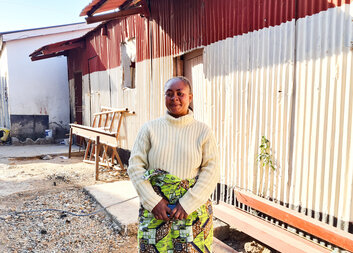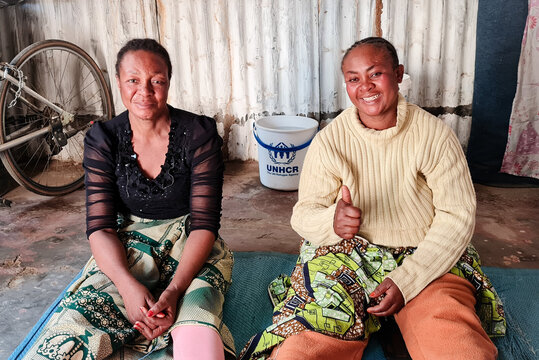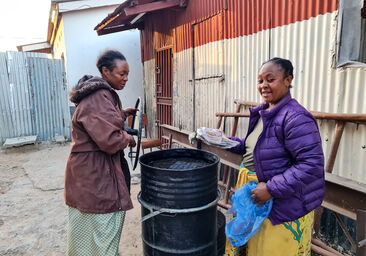18th June, 2021 will be remembered as the day that changed my life forever. That Friday, I received a call to interview two sisters from the Democratic Republic of Congo. Sitting in the metal shack they now call home, I listened to Annie and Bibiane recount chilling details of how they fled armed rebels in South Kivu.
Annie was a housewife, while her sister Bibiana was running a successful grocery store with her husband. Tragedy followed when an armed Mai-Mai militia knocked at Bibiane’s door asking about her husband’s whereabouts. Three days later, his body was found in an abandoned house, defaced and mutilated.
“Immediately after the death of my husband, the Mai-Mai conducted another raid. This time, I was captured alongside my sister Annie, and her husband. We were taken to a remote bushland, there we were separated to be raped by several Mai-Mai, while my brother-in-law was being tortured,” recalls Bibiane.
Pictured: From Left, Bibiane and Annie
Escape from South Kivu
South Kivu and North Kivu have been the center of the conflict which followed the Second Congo War. Civilians find themselves trapped in the middle of confrontations between various warring factions and armed groups. The Mai-Mai militia, characterized by rituals which include wearing human body parts for accessories, is renowned for gross human rights violations.
As of 2020, the UNHCR has reported that Congo DRC has the largest internally displaced population in Africa, with more than 5.2 million displaced persons. From the time Annie and Bibiane fled in 2017, widespread killings, looting and sexual violence against women and girls remain rampant. Women are routinely shot or stabbed in their genitals, after they are raped.
“We escaped on the night that my husband was abducted, and we have never seen him since. We arrived in Zambia after travelling for 3 days by boat. But unfortunately, we found out that two of Bibiane’s seven children had gone missing following the stampede to board,” Annie continues.
Urban Refugees
On arrival in Zambia, the women were granted Assylum Seeker status by the Ministry of Home Affairs, after which they were referred to UNHCR and Caritas Czech Republic.
“Once we resettled as urban refugees, we realized we were not able to keep up with rentals. Caritas Czech Republic reached out and assisted both my sister and I with a cash grant of K2000 each. We used the money to purchase a Smoking Kiln to start our fish-smoking business. With 20 orders a week, the business took off but was later set-back by the Covid-19 pandemic,” says Annie.
Since the outbreak of the coronavirus, Caritas Czech Republic has helped vulnerable refugees cope with the economic impact of the pandemic. Refugees residing in Lusaka struggle to be self-reliant due to limited access to education, as well as formal or self-employment. The dire economic constraints they face means they are more likely to reside in compounds and high risk, densely populated areas.
“Caritas Czech Republic has supported small businesses affected by Covid restrictions by providing access to recovery capital, as well as complimentary entrepreneurship training,” says Programme Manager, Lucie Hrabcová.
Pictured: Bibiane and Annie’s fish smoking business
Funding shortfalls
Displaced people are living in dire conditions without shelter, food, water or health care. In the context of Ebola and COVID-19, the lack of access to toilets, clean water and hygiene products is of particular concern. Furthermore, families do not have enough essential items like blankets, sleeping mats or cooking materials.
With the ravaging pandemic and continuous displacement driven by insecurity or disaster, the capacity of displaced people to cope continues to be eroded. Caritas Czech Republic has therefore scaled up its activities; prioritizing people in need of protection, such as survivors of sexual violence, refugees and their host communities.
According to UNHCR’s estimates, 934,381 Congolese have fled to seek refuge in nearby countries such as Zambia. Yet, in spite of the ongoing violence and insecurity, Caritas Czech Republic’s efforts to respond with humanitarian assistance remains severely underfunded.








